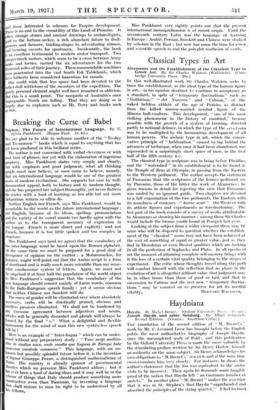Breaking the Curse of Babel
l/elphos : The Future of International Language. By E. Sylvia Pankhurst. (Kegan Paul. 2s. tit.)
WE are glad to be able to welcome another of the " To-day and To-morrow " books which is equal to anything that has vet been produced in this brilliant series.
The author is not concerned with verbal cleverness or with neat turn of phrase, nor yet with the elaboration of ingenious prophecy. Miss Pankhurst states very simply and clearly, but with emphasis and good judgment, what all thinking people must now believe, or soon come to believe, namely, that an international language would be one of the greatest assets of modern civilization. She supports her case by well- documented appeal, both to history and to modern thought, and she has prepared her subject thoroughly, yet never flattens the reader with a load of learning, as less able but not more industrious writers so often do.
Neither English nor French, says Miss Pankhurst, would be acceptable to the world as the future international language ; not English, because of its idiom, spelling, pronunciation and the variety of its vowel sounds (we hardly agree with the author as to the transparent accuracy of expression in our tongue—French is more direct and explicit); and not French, because it is too little spoken and too complex in structure.
Miss Pankhurst says (and we agree) that the vocabulary of the inter-language must be based upon the Roman alphabet. At the same time we must be prepared for a good deal of divergence of opinion on the matter : a Mohammedan, for instance, might well point out that the Arabic script is a form of shorthand and is really much more scientific than our some- what cumbersome system of letters. Again, we must not be surprised if at least half the population of the world object to Miss Pankhurst's suggestion that the vocabulary of the new language should consist mainly of Latin words, common to the Indo-European speech family : yet it seems obvious that neither Chinese nor Sanskrit will do.
The curse of gender will be eliminated save where absolutely necessary, verbs will be drastically pruned, obvious and needless passives eliminated. We shall not be burdened by any tiresome agreement between • adjectives and nouns, articles will be generally discarded and plurals will always be formed by the final " s." What a delightful and flexible instrument for the mind of man this new syntax-less speech Will be I Here is an example of " Inter-lingua " which can be under- Stood without any preparatory study : " Tune .surge mu ltitn- difte de studios novo, uncle resulla que linguas de Europa babe nunteroso vocabulo commune." This language, with an un- known but possibly splendid future before it, is the invention 01 Signor Giuseppe Peano, a distinguished mathematician of Turin. His country is already sponsor of governmental theories which we presume Miss Pankhurst abhors ; but it has ever been a land of daring ideas, and it may well be in the scheme of things that Italy should produce something more no.. nstructive even than Fascismo,- by inventing a language ,.that shall restore to man his right to be understood by all lids fellows.
Miss Pankhurst very rightly points out that the present international incomprehension is of recent origin. Until the seventeenth century Latin was the language of learning in Europe : Arabic, Persian,-Sanskrit and Chinese were studied by scholars in the East ; but now has come the time for a new and scientific speech to end the polyglot confusion of earth.






























































 Previous page
Previous page